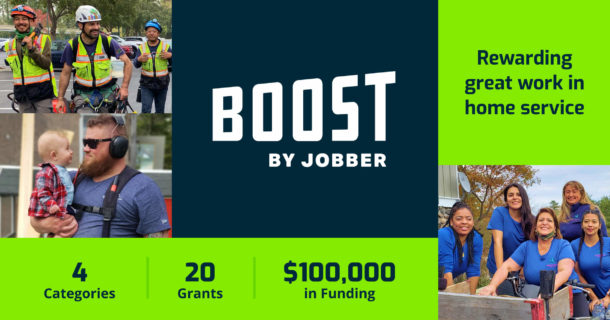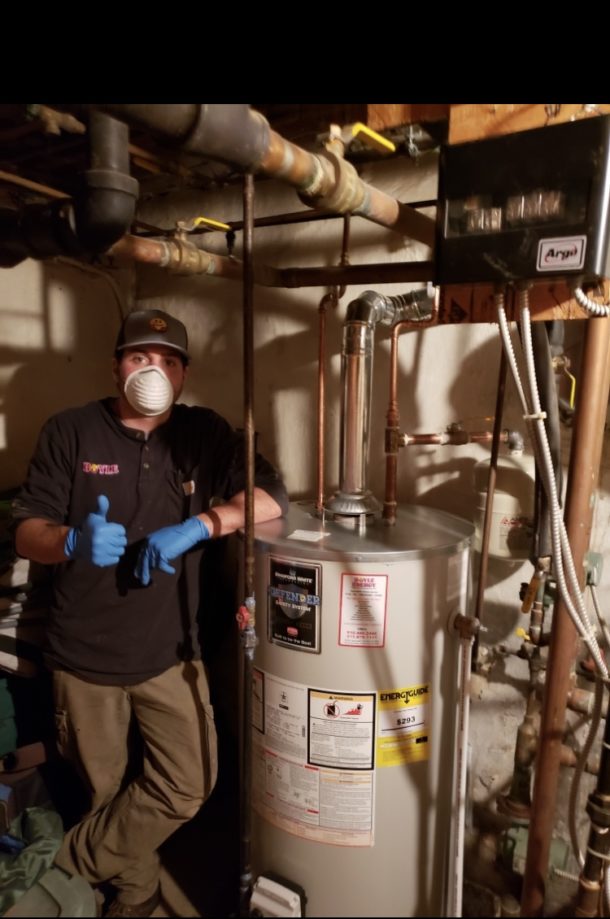After a challenging year resulting from the global pandemic that hit full force in March 2020, the Plumbing-Heating-Cooling Contractors—National Association (PHCC) reports that – one year later – there are signs that conditions are improving. A contractor sentiment survey conducted by PHCC finds that 84% of respondents rank the continuing impact of COVID-19 on their Read more
contractors
After a challenging year resulting from the global pandemic that hit full force in March 2020, the Plumbing-Heating-Cooling Contractors—National Association (PHCC) reports that – one year later – there are signs that conditions are improving.
A contractor sentiment survey conducted by PHCC finds that 84% of respondents rank the continuing impact of COVID-19 on their businesses as having either a “low” or “medium” impact compared to 57% in spring 2020, when PHCC first began tracking trends during the pandemic. In addition, the number of people ranking impact as “medium high” to “high” has dropped to 9% from 43% in spring 2020.
“A year after COVID-19 hit, PHCC members indicate that they are cautiously optimistic that we are turning a corner toward better times ahead,” says PHCC President Hunter Botto. “Respondents also noted that their businesses have stabilized after several difficult months of disruption. They also see new business opportunities in the future, which is very good news for our industry.”
In fact, an annual environmental scan conducted by PHCC in January 2021 predicted an increased demand for home improvement spending; touchless products; upgraded and energy efficient equipment; smart technology; air and water filtration and purification; and IAQ markets, including UV and bipolar ionization.
While the overall outlook is positive, the plumbing and HVACR contractors responding to the sentiment survey cite several ongoing challenges, including maintaining a safe and fully operational staff; increased operating costs related to new safety requirements; addressing employee and customer health and safety concerns; customer delays on projects because of economic concerns; disruptions in the supply channel; and a fear of a potential recession.
Regarding manufacturers and suppliers’ responsiveness to supply chain issues, respondents noted many have been helpful by offering creative alternatives to products currently unavailable. There was an overall recognition that manufacturers and suppliers are also facing material cost increases and shortages, transportation challenges, workforce issues, etc. “They have been super helpful, but have had their own people issues, concerns and interruptions,” one contractor said.
Contractors indicate they have established many safety procedures to mitigate safety risks for employees and clients, including employee screening, social distancing, disinfection measures, increased communication about safety protocols and requirements for Personal Protective Equipment.
“As we look back on the last year, PHCC members – operating as essential businesses – illustrated time and time again that they are true professionals committed to keeping their employees, customers and communities healthy and safe,” Botto says. “As always, our members have shown they are extremely resilient in tough times.”
Another positive indicator is that – after recently completing its annual membership renewal process this spring – PHCC realized an increase in both renewing and new members.
“We are grateful for the loyalty demonstrated by our members throughout this crisis,” Botto says. “We are also excited to see growth in membership when business owners are assessing the ROI on every expenditure. Now more than ever, they can see the value of supporting and engaging with their association.”
To help navigate the many unexpected changes they faced, members relied on PHCC resources and videos via its COVID-19 Recovery Center, as well as monthly webinars, state and local support, advocacy, member discounts and access to Personal Protective Equipment.

Launched during Jobber Professional Development Day, Boost by Jobber will help launch, grow, and strengthen small home service businesses Jobber, the leading provider of home service management software, today unveiled Boost by Jobber, a grant program to further support the hard-working entrepreneurs within the home services sector. Aspiring entrepreneurs, new business owners, and longtime home Read more
Launched during Jobber Professional Development Day, Boost by Jobber will help launch, grow, and strengthen small home service businesses
Jobber, the leading provider of home service management software, today unveiled Boost by Jobber, a grant program to further support the hard-working entrepreneurs within the home services sector. Aspiring entrepreneurs, new business owners, and longtime home service entrepreneurs are invited to apply for free grants ranging from $1,000 to $20,000 depending on the category their business qualifies for. Twenty home service businesses across 50+ industries such as lawn care, plumbing, residential cleaning, and painting, will be awarded $100,000 in total. Applications are now open through May 5, 2021. Finalists will be announced in July 2021 with the list of winners announced in August 2021.

“Home service entrepreneurs impact their local communities and neighborhoods in meaningful ways,” said Sam Pillar, CEO & co-founder at Jobber. “They employ millions of people while operating behind-the-scenes to keep homes, offices, and other spaces safe and in good working order—yet, despite their important contributions, small businesses are largely underserved when it comes to business financing. Boost by Jobber helps address this gap by providing service business entrepreneurs with some extra working capital that may not otherwise be available through traditional banks and government grant programs.”
Royce Ard, who owns My Amazing Maid with his wife, Tamara, further validates this statement. “Typically when I see a grant, I’m almost always assuming it’s for a specific cohort and I wouldn’t qualify,” explained Ard. “Loans are very, very, very hard to get. As far as going to a bank and getting $10,000 for a small business like ours, you’re not going to get it.”
Boost by Jobber grants are organized into categories that reflect various stages of company growth, from ideas on paper to recently launched ventures to established businesses—as well as an additional category for COVID-19 support. Five winners will be selected from each of the following:
- Almost-entrepreneurs (pre-business): Those who have the drive to start and run a home service business, but need funds to get started.
- New business owners (0-3 years): Entrepreneurs who are in the early stages of building their team, client list, and services.
- Experienced business owners (3+ years): Entrepreneurs who are ready to scale their mature business to the next growth stage.
- COVID-19 support: Entrepreneurs seeking financial support or resources for their team’s well-being.
Jobber spoke with dozens of service professionals to better understand the impact extra cash flow could have on a business, to create the grant categories, and to determine the dollar values assigned to each grant. Whether a company is looking to purchase new equipment, increase marketing dollars, launch a new service, train teams, or is in need of financial relief, funds from the Boost by Jobber program can make a big difference in helping small business owners be more successful.
“People don’t understand the value of the cash flow,” stated Steven Knight, Partner at Mosaic Home Services Ltd. “It’s not necessarily only helping the business. It’s helping the business owners. Their ability to lead people and calm down. Cash flow helps them be a better business leader.”
Boost by Jobber is one of many initiatives within Jobber’s home service ecosystem that is dedicated to supporting the home service entrepreneur, whether it’s through the company’s award-winning business management software, resources such as Jobber Academy, community building via the company’s Entrepreneurship Group on Facebook, and more.
To learn more about Boost by Jobber or to apply, visit: http://boostbyjobber.com.

Let’s face it. The way that Americans shop has changed. The COVID-19 pandemic has been a boon to online retailers and delivery services. Consumers who are leery about walking into a store will buy online for delivery or order it for curbside pickup. You and your family members probably ordered something online today. There’s a Read more
Let’s face it. The way that Americans shop has changed. The COVID-19 pandemic has been a boon to online retailers and delivery services. Consumers who are leery about walking into a store will buy online for delivery or order it for curbside pickup. You and your family members probably ordered something online today. There’s a temptation to let that drift into your professional life as well, but it may not work for securing the brands or quality of products that you are used to securing and providing to your customers.
Plumbing wholesalers must acknowledge that home improvement retailers are not going to go away. But both plumbing wholesalers and plumbing contractors must realize that they, themselves, are offering their customers so much more than a product. Anybody can offer a product for sale but wholesalers and contractors succeed by offering services that the competition either cannot or will not offer.
The big box stores are doing their best to offer services and incentives that mimic those offered by plumbing wholesalers. The issue for now, however, is they can only offer these in a general, corporate way, while the local wholesaler takes great pride in knowing the personality and needs of its contractor customers. A wholesaler knows who those contractors are, what their specialties are, what they want. They know what their customers buy, and they don’t have to look it up in their computer records because they and their counter people have an ongoing business relationship with their contractors. They interact with contractors and their plumbers all the time and deliver to their shops or jobsites.
Another avenue for wholesalers to create relational equity and provide value is to provide on-site training, by leveraging manufacture resources. Heating and plumbing manufacturers and wholesalers realize that one of the best ways to form lasting relationships with contractors is to offer technical training. Contractors will sell products with which they are familiar and comfortable; that’s how they make a profit. If a product is difficult or confusing to install or results in call-backs, they won’t sell it. Homeowners are doing their homework online on space and water heating systems and, while they are well-informed, they certainly don’t know as much as contractors. Contractors must be able to demonstrate a thorough knowledge of their products so that they can discuss, with confidence, why their customers should want to buy what they’re selling.

The way to get that recommendation is through training. Plumbing wholesalers should be set up to offer training, both in-person and virtually. Most training has become virtual because of COVID-19 and we will undoubtedly see some of that continue in the years ahead. It’s incumbent on wholesalers to have the equipment to record video training or to livestream training to their customers. But they should also invest in a proper classroom setup in their facilities in which manufacturers’ trainers and reps can conduct in-person training.
Distributors should emphasize the inventory management and financing services that they offer. They can help contractors keep up with code changes and changes to licensing requirements in their area. They can inform contractors about manufacturers’ rebate offers or give them advice on postcard mailings and other marketing tactics. Everything you do and every bit of information you can provide to help your contractors creates that level of “stickiness” that makes it hard for them to want to go elsewhere.
When thinking about the differences between a local plumbing wholesaler and a big box store, contractors should think about the differences between themselves and a big box store. Any homeowner can walk into a big box store and buy plumbing products. Some will install what they buy on their own and others will reach out to their handy friend. The biggest trend here, however, is that consumers are walking into the box store to buy their plumbing and HVAC needs and the installation that goes with it. It’s one-stop shopping for the consumer. The box stores have swung away to a degree from the DIYers and have now positioned themselves as the seller and installer for today’s consumers.
But what wholesalers offer is individualized support and personal relationships. When one of a contractor’s customers has an emergency on a Saturday night, the contractor has the cell phone number of the wholesaler manager who’s going help them get the replacement equipment they need. Some wholesalers even have formal 24×7 programs to address both residential and commercial emergency installations or repairs. Try doing that through a big box store. And when it comes to a homeowner installing his new bathroom or kitchen, some wholesalers have showrooms they can walk through to find unique fixtures that they will never be able to get in a retail environment.
Bradford White continues to count on wholesale distribution to support the professional specification and installation of its products. Our distributors bring a level of service and support to the equation that keeps contractors coming back and helps them better serve the end-user.
 GUEST BLOG BY: Matt Kozak, Vice President – Sales for Bradford White Water Heaters.
GUEST BLOG BY: Matt Kozak, Vice President – Sales for Bradford White Water Heaters.
A graduate of Loyola College in Baltimore, Matt joined Bradford White in 2007 as a regional sales manager in the southeast.
He progressed to become director of sales for the Eastern U.S. and now oversees sales management and business development teams as vice president of sales for the U.S.
Matt has been actively involved in industry organizations such as the American Supply Association (ASA) and the Association of Independent Manufacturers’/Representatives, Inc. (AIM/R).
MADISON, Wis. In a new study conducted by Wisconsin Safety Council (WSC) and Rural Mutual Insurance Company, 85% of respondents said they “sometimes” or “often” see a coworker come to work sick even though he/she should have stayed home. In the current environment, exposure to sick coworkers is the leading safety concern for workers in Read more
MADISON, Wis. In a new study conducted by Wisconsin Safety Council (WSC) and Rural Mutual Insurance Company, 85% of respondents said they “sometimes” or “often” see a coworker come to work sick even though he/she should have stayed home. In the current environment, exposure to sick coworkers is the leading safety concern for workers in Wisconsin.

In an effort to identify top workplace safety concerns and provide solutions during National Safety Month in June, WSC and Rural Mutual polled more than 180 WSC members, the majority of whom are safety professionals working in Wisconsin trades, including contractors, manufacturers and construction workers. The study was completed in April.
“Amidst the COVID-19 pandemic, we know businesses and organizations across the state are looking to create safer work environments now more than ever,” said Aaron Huebner, WSC executive director. “This study revealed safety professionals should focus on establishing initiatives that prevent the spread of infection and reduce exposure to employees who are sick.”
The respondents indicated several other top safety risks in the workplace:
- Interacting with hazardous materials (80%)
- Driving for work-related activities (80%)
- Standing for more than two hours in a row (79%)
- Working in high noise levels where a raised voice is needed to talk to people less than four feet away (76%)
A new, free e-book from Rural Mutual and WSC is now available to help safety professionals and trade workers in Wisconsin address these leading safety concerns. The ‘Work Safe in Wisconsin’ e-book offers easy to implement solutions for a safer and healthier workplace.
“Helping Wisconsin businesses lower their safety risks is a big part of Rural’s mission,” said Chris Schlechta, safety and loss control manager at Rural Mutual. “We’re excited to work with WSC to introduce the ‘Work Safe in Wisconsin’ e-book in hopes to inspire workers to jumpstart safety initiatives during National Safety Month and throughout the year.”
The e-book includes tips for those looking to create a safer workplace, including:
- Foster a safety culture. Ensure all employees feel comfortable reporting a safety concern when they see it. See something, say something, do something.
- Give employees a voice at the table. Before implementing a new safety initiative or when elevating existing safety programs, engage the frontlines and ask employees for their feedback.
- Adopt a proactive, not reactive approach. If we wait until an accident happens to address a safety concern, we will never get ahead of the issue.
To download a free copy of the e-book, visit www.ruralmutual.com/insurance/business/work-safe/.
With the health and safety of attendees, staff and the public top of mind during the current public health crisis, the Plumbing-Heating-Cooling Contractors—National Association (PHCC) announces that it will offer its annual conference, PHCCCONNECT2020, in a virtual format. The event, scheduled for Sept. 30-Oct. 1, will offer a valued-packed online program, full of high-quality education and Read more
With the health and safety of attendees, staff and the public top of mind during the current public health crisis, the Plumbing-Heating-Cooling Contractors—National Association (PHCC) announces that it will offer its annual conference, PHCCCONNECT2020, in a virtual format. The event, scheduled for Sept. 30-Oct. 1, will offer a valued-packed online program, full of high-quality education and networking opportunities.
“This decision to ‘bring CONNECT to you’ was made after much careful consideration and input from PHCC members,” said PHCC President Jonathan Moyer. “It was the right thing to do in these current times, and we embrace the opportunity to safely deliver this highly anticipated event in a new innovative, easy-to-use format.”
With the theme “Expand Your Vision for Success,” the virtual conference will offer high-caliber keynote speakers, timely and relevant educational sessions and new virtual networking events, with the added benefit of experiencing it all from the comfort of an office or home.
Program highlights include:
- More than 20 education sessions
- Inspirational and informative keynote speakers
- Live Q&A with select speakers
- A virtual Product & Technology Showcase
- Reimagined networking opportunities
- Access to education session content for 30 days
- Affordable Experience – No travel & hotel costs & reduced registration rates
More specific details about the event will be available in early July. For updates, visit www.phccweb.org/connect.
